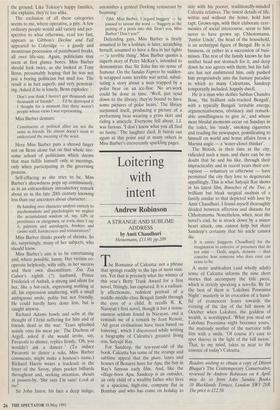Loitering with intent
Andrew Robinson
A STRANGE AND SUBLIME ADDRESS by Amit Chaudhuri Heinemann, f13.99, pp.209 The Romance of Calcutta: not a phrase that springs readily to the lips of most visit- ors. Yet that is precisely what the winner of this year's Betty Trask Award for a first novel, fittingly, has captured. It is a radiant- ly affectionate, redolent portrait of a middle-middle-class Bengali family through the eyes of a child. It recalls R. K. Narayan's first novel, though it has a sensu- ousness seldom found in Narayan, and it reminds me of a remark by Jean Renoir, `All great civilisations have been based on loitering', which I discovered while writing a biography of Calcutta's greatest living son, Satyajit Ray.
For Sandeep, the ten-year-old of the book, Calcutta has some of the strange and sublime appeal that the ghats, lanes and houses of Benares have for Apu, the boy in Ray's famous early film. And, like the village-born Apu, Sandeep is an outsider, an only child of a wealthy father who lives in a spacious, high-rise, company flat in Bombay and who has come on holiday to
stay with his poorer, traditionally-minded Calcutta relatives. The tiniest details of life, within and without the home, hold him rapt. Grown-ups, with their elaborate cere- monies of social intercourse, seem to him never to have grown up. Chhotomama, `Junior Uncle', the head of the household, is an archetypal figure of Bengal. He is in business, or rather in a succession of busi- nesses. The rest of the family knows he has neither head nor stomach for it, and deep down he too agrees with them; but his fail- ure has not embittered him, only pushed him progressively into the fantasy paradise in which so many Calcuttans, Sandeep temporarily included, happily dwell.
He is a man who deifies Subhas Chandra Bose, 'the brilliant side-tracked Bengali', with a typically Bengali 'irritable energy, argumentativeness, obstinacy and remark- able unwillingness to give in', and whose most blissful moments occur on Sundays in the toilet, his 'study', smoking cigarettes and reading the newspaper, pontificating to himself on world and home affairs from a Marxist angle — a 'water-closet thinker'.
The British, in their time in the city, ridiculed such a man, and there can be no doubt that he and his like, through their impracticality and in recent years their cor- ruption — voluntary or otherwise — have permitted the city they love to degenerate appallingly. This is what Satyajit Ray shows in his latest film, Branches of the Tree, a brilliant but bleak surgical analysis of a family similar to that depicted with love by Amit Chaudhuri. I found myself thoroughly divided between affection and distaste for Chhotomama. Nonetheless, when, near the novel's end, he is struck down by a minor heart attack, one cannot help but share Sandeep's certainty that his uncle cannot die.
It is easier [suggests Chaudhuri] for the imagination to conceive of presences that do not exist — Gods, angels, demons — than conceive how someone who does exist can cease to be.
A more ambivalent (and wholly adult) sense of Calcutta informs the nine short stories that accompany the title piece, which is strictly speaking a novella. By far the best of them is `Lakshmi Poornima Night': masterly in its evocation of a hand- ful of evanescent hours towards the evening of the day of the full moon in October when Lakshmi, the goddess of wealth, is worshipped. 'What you steal on Lakshmi Poornima night becomes yours,' the matronly mother of the narrator tells him with a smile. 'Of course it's easy to spot thieves in the light of the full moon.' That, to my mind, takes us near to the essence of today's Calcutta.
Readers wishing to obtain a copy of Dhiren Bhagat's The Contemporary Conservative, reviewed by Andrew Robinson on 6 April, may do so from John Sandoe Books, 10 Blacklands Terrace, London SW3 2SR. The price is £12.50.


























































 Previous page
Previous page